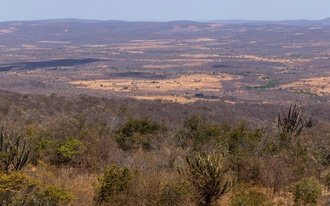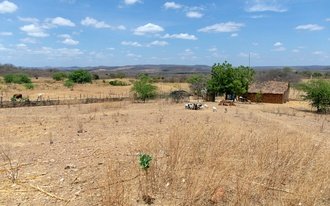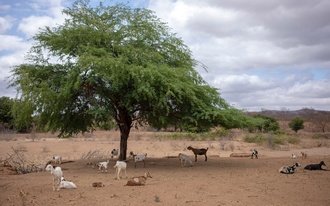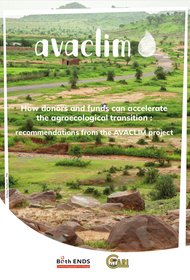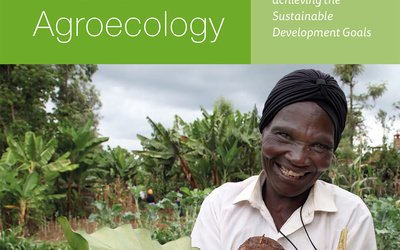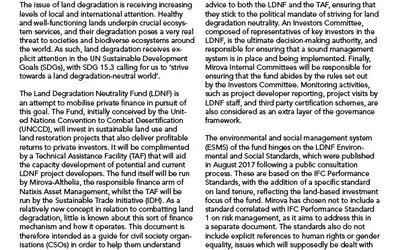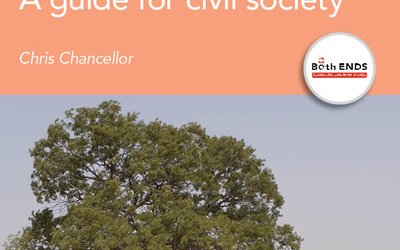Fighting desertification in the Brazilian Sertão
The farmers in the Sertão do Araripe region in Pernambuco state are smart. The small-scale family farmers know that securing a sustainable livelihood on the rich but vulnerable soils of the Sertão is only possible if they take good care of the environment. That means sound agriculture, making the best of every drop of available water, diligent use of natural fertilisers and pest-control and fighting for laws and policies that stimulate conservation rather than exploitation. The organisation CAATINGA helps the farmers to face the challenging conditions.
In 2012, over 135 farming families founded the Association of Agroecological Farmers of the Araripe (ECOARARIPE). Over the years ECOARARIPE grew, and currently over 500 farming families have joined the association. Its main goal is to help its members in the production, processing and marketing of their products and to advocate for policies that allow the farmers to practice sustainable agriculture.
But not only the environment is a challenge. Farmer's livelihoods also face threats from large-scale agribusiness, that are slowly but surely gaining ground, aided by legislation initiated under the conservative Bolsonaro administration. Cattle farmers, for example, face few legal restrictions in monopolising the available water. The argument is that big (agri)business means export and export means money. Likewise, the current Brazilian government does little to mitigate the challenges of climate change. The Sertão is heavily affected by changing climatic conditions.
Biological pest control
For small-scale farmers, the advise of specialised NGOs is important. One of the supporting organisations is CAATINGA (also see our publication "Unlocking Public Finance for Agroecology"). CAATINGA helps the farmers of the Sertão do Araripe to get acquainted with methods for agroecological practices. Paulo Pedro De Carvalho, coordinator of CAATINGA, explains: "We train farmers in soil, water and biodiversity conservation. Techniques to restore degraded lands are tried, evaluated and practised, with emphasis on issues like biological pest control and use of natural protectors. We use, for example, bait plants such as sesame, to control cotton pests. We stimulate the practice of crop rotation, the use of animal traction in soil preparation and crop treatments in order to keep and restore soil health." Results of the soil recovery and the greater biodiversity are that families have increased their productivity and strengthened their financial autonomy.
The support is not just technical. Through CAATINGA the relatively isolated farmers of the Sertão are connected with a national, regional and global network of farmers and specialists in agroecology specifically for semi-arid areas: information is exchanged, good practices are shared. "Operating within a network strengthens the effectiveness of agroecology", says Paulo Pedro De Carvalho. At the international level, CAATINGA is part of the global Drynet network. Drynet members in four continents are operating in ecosystems that are susceptible to land degradation and desertification. Drynet advocates for policies that support sustainable land use and restoration by local communities. Through Drynet, CAATINGA is linked with Both ENDS.
CAATINGA has been successful in providing a way out to the logic of land concentration and agricultural modernisation based upon the use of synthetic pesticides and fertilizers and deforestation. "We support the lobby for access to land and for farmers' participation in policy making."
A matter of survival
'A união faz a força' – unity is strength – farming families in the Araripe say. It is a cliché perhaps, but in the Sertão it is a matter of survival. Working together is the only way to escape poverty and build a dignified life. The farmers share production facilities that enable them to process their crops into products that yield higher prices. And so, during the yearly harvest festival in the region, the members of ECOARARIPE can be seen proudly presenting bottles of ecologically produced sesame oil and other high-quality products produced by the farmers and processed by their collective facilities.
Biodiversity is an important factor in the sustainability of the livelihoods of the family farmers. The preservation of biodiversity lies to a large extent in the hands of the rural families that often have been working their lands for many decades. All households of ECOARARIPE have family seed banks, and most participate in Community Seed Banks that are essential for the conservation of the Creole seeds that pass from generation to generation, increase seed diversity, and help in food and nutritional autonomy and security of families.
ECOARARIPE provides opportunities for farmers to obtain prices that cover the costs of agroecological production and processing. It has contributed to a renewed relationship between producers and consumers in the countryside and cities. And, last but not least, it is fruitful in such a way that it sparked the interest of other farmers to join the initiative.
The Sertão
The Sertão is a large, semi-arid region in the Northeast of Brazil. The region, that extends over 9 north-eastern states, is marked by scarce and increasingly unpredictable rainfall and prolonged drought periods that severely hit agriculture. Without smart agriculture a sustainable livelihood in the Sertão is impossible. The soil gets degraded, making the next harvest even more difficult. Hunger is not uncommon in this part of the world.
For more information
Read more about this subject
-
Transformative Practice
Agroecology
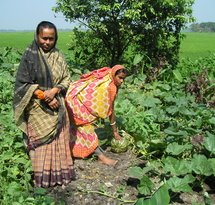
Agroecology is a diverse set of agricultural practices, a field of science and a social movement. It aims to transform food systems towards greater ecological sustainability, social justice, and resilience. Both ENDS and CSO-partners around the world support farmers and pastoralists practising agroecology, both on the ground and in gathering political and financial support.
-
News / 20 June 2021
Organic wild rooibos in South Africa’s dryland
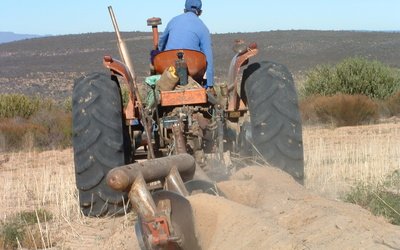
South Africa is the home of rooibos, an ancient, health giving herbal infusion, discovered thousands of years ago by the KhoiSan, indigenous peoples of the Southern part of Africa. During the last century, rooibos has been increasingly commercialised, mainly by white South African farmers who produce it on a very large scale, causing environmental damage, soil erosion and loss of biodiversity. Fortunately, small-scale, environmentally sound and community-led rooibos cultivation initiatives also exist. Our long-standing South African partner Environmental Monitoring Group (EMG) has, for more than two decades, been involved in this type of rooibos cultivation with the communities in the Suid Bokkeveld, in the western part of South Africa. Although it was not always easy, Noel Oettle, senior advisor at EMG, thinks this way of producing is the future.
-
News / 17 June 2021
Celebrating community led initiatives on World Desertification, Land Degradation and Drought Day
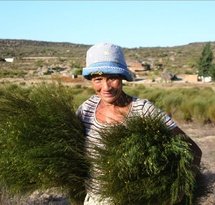
Today is World Desertification, Land Degradation and Drought Day. Such a day is more than needed to get attention for desertification, land degradation and drought that are threatening and hitting hundreds of millions of people in many regions throughout the world. While the causes - such as large-scale agriculture, use of pesticides, water extraction and climate change - are clear and need to be stopped, it is just as important to focus on solutions like restoration and sustainable land use.– in line with World Desertification, Land Degradation and Drought Day's theme for this year: 'Restoration. Land. Recovery. We build back better with healthy land', we will therefore especially focus on inspiring solutions during the next few weeks.
-
Publication / 10 October 2022
-
Event / 12 September 2019, 08:00 - 10:00
UNCCD COP14: From global frameworks to local actions
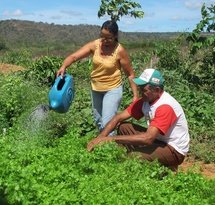
At the UNCCD COP14 in India, which is taking place from 2-13 September 2019, Both ENDS is co-organising a number of side events.
-
Event / 4 September 2019, 13:00 - 15:00
UNCCD COP14: Pathways for big money to reach local communities
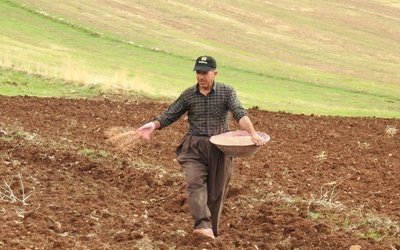
At the UNCCD COP14 in India, which is taking place from 2-13 September 2019, Both ENDS is co-organising a number of side events.
-
Publication / 11 July 2019
-
Press release / 7 March 2022
New report: investment in agroecology necessary for healthy global food system
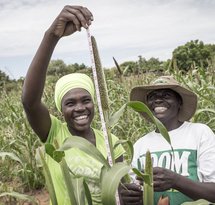
A recent study by Profundo for Both ENDS and Oxfam Novib shows that investment in agroecology is necessary for a sustainable and inclusive global food system. Today, some 768 million – one in ten – people suffer from hunger or a severe shortage of food on a daily basis. Conflict, economic stagnation caused by the Corona epidemic, and the climate crisis present an immediate threat to the production of and access to sufficient nutritious food. Agroecology, a form of agriculture that places small-scale farmers, the natural environment and short supply chains at the centre of food production, makes communities in developing countries more resilient and helps them combat hunger. The study concludes however that major donors, including the Netherlands, are so far providing insufficient support for agroecology.
-
Letter / 9 June 2022
Appeal to the FAO to rescind the FAO partnership with CropLife
Pesticide Action Network and 430 civil society and indigenous peoples organizations from 69 countries have sent a letter of concern to the 170th session of FAO council about the FAO partnership agreement with CropLife International.
CropLife International is a global trade association whose members are the world's largest agrichemical, pesticide and seed companies: BASF, Bayer Crop Science, Corteva Agriscience, FMC Corporation, Sumitomo Chemical and Syngenta. The UN Food and Agricultural Organisation (FAO) en CropLife International have started a partnership in 2020 to collaborate on pesticide use. We think that this partnership is incompatible with FAO's obligations to uphold human rights, directly counters any efforts toward progressively banning Highly Hazardous Pesticides, and undercuts the FAO and several Member States' support for agroecology and other transformative practices.
The letter asks the Council to review and end immediately the partnership agreement with CropLife International.
-
News / 30 August 2019
Dealing with drought: the UNCCD COP in India
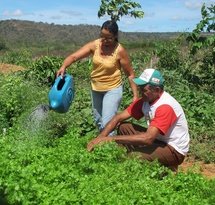
Worldwide, hundreds of millions of people live in areas where the soil is depleted; often they are forced to, or the region they have been living in for generations has become increasingly arid over time. The desert is advancing and this is a global problem. Opinions about the causes of land degradation and desertification, but especially about the solutions, are very divided. To discuss this, the biennial global conference on desertification will take place from 2 to 14 September. This is where policymakers, scientists, NGOs, female and male farmers and pastoralist, herders and companies from all over the world come together. Our colleague Nathalie van Haren is present at the conference and explains why.
-
News / 30 September 2021
Agroecology in Kenya: fighting water pollution while securing food production
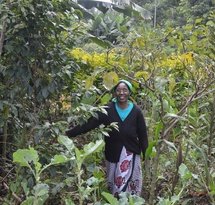
About 75% of Kenyans earn all or part of their income from the agriculture sector which accounts for 33% of the country's Gross Domestic Product (GDP). However, agricultural productivity has stagnated in recent years. Various factors have contributed to low agricultural productivity, including an overall decline in soil fertility because of the continuous removal of nutrients by crops; poor farming practices; land degradation and overuse/misuse of synthetic fertilizers that acidify the soil. The solution against these problems is: agroecology.
-
Dossier
Finance for agroecology
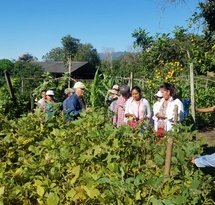
The lion's share of public budgets for climate, agriculture and development still goes to conventional agroindustrial projects that contribute to the current climate, food and biodiversity crises. Both ENDS and our partners are calling for a transition to agroecological practices that are people- and environment-friendly.
-
Transformative Practice
Inclusive Land Governance
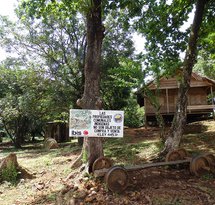
Both ENDS works with partners around the world to ensure that land is governed fairly and inclusively and managed sustainably with priority for the rights and interests of local communities.
-
Event / 6 September 2017
UNCCD COP 2017 - CHINA
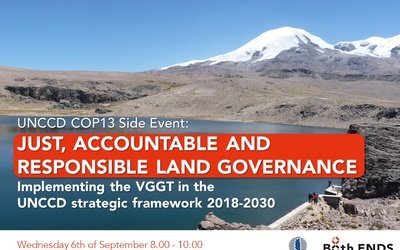
From 6-16 september, the 13th Conference of Parties' of the UNCCD (UN Convention to Combat Desertification) took place, this time in Ordos, China. The UNCCD is the global convention of the United Nations on combating desertification and drought. Every country in the world has signed this convention. Canada withdrew in 2012, but in 2016 - under the Trudeau administration - started a process to re-enter the convention. Both ENDS is a member of Drynet, a network of local organisations and communities in dry regions searching for ways to use land in a sustainable manner.
-
Publication / 14 January 2019
-
Publication / 14 January 2019
-
Event / 6 September 2019, 13:00 - 15:00
UNCCD COP14: Communities regreen the Sahel
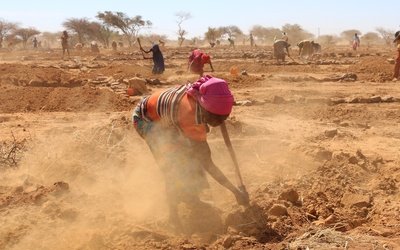
At the UNCCD COP14 in India, which is taking place from 2-13 September 2019, Both ENDS is co-organising a number of side events.
-
News / 15 June 2023
How Agroecological Logbooks empower women farmers in Brazil
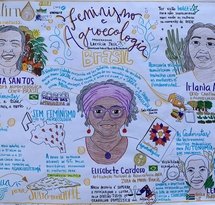
In the Jenipapo community, in the north-east region of the Caatinga Biome in Brazil, farmer Fátima Maria dos Santos runs her farm. Fátima is applying the principles of agroecology on her farm by having a cistern that collects rainwater, retaining native vegetation and developing an agroforestry system that comprises of native and fruit trees and crops and medical plants. Fátima is also one of the first farmers to be part of the 'Caderneta Agroecológica' or 'Agroecological Logbook' initiative, that stimulates women farmers to monitor their food production. This way, they get more insights about the value of production for the family, about monetary and non-monetary benefits and the preservation of soil health and biodiversity.
-
News / 29 October 2019
What have we learned from the UN Convention to Combat Desertification?
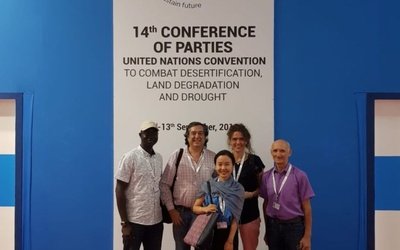
The second United Nations Convention to Combat Desertification (UNCCD) was held from 2 to 14 September in New Delhi, India. Our colleague Nathalie has been working together with many civil society organisations for several years to show the UNCCD that large numbers of local communities around the world are working on sustainable land use and on combating desertification and land degradation, and that land-use security is essential.
-
News / 14 June 2023
Both ENDS’s partners combat land degradation and drought
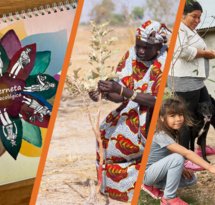
For decades, the local partner organisations of Both ENDS have been developing and promoting ways to fight land degradation, desertification and drought in their surroundings. And this accounts not only for regions like the Sahel, but also for forests and wetlands. To celebrate the UNCCD's Desertification and Drought Day 2023, we'd like to show a few examples of how our partners restore ecosystems to serve the well-being of people and the environment.



